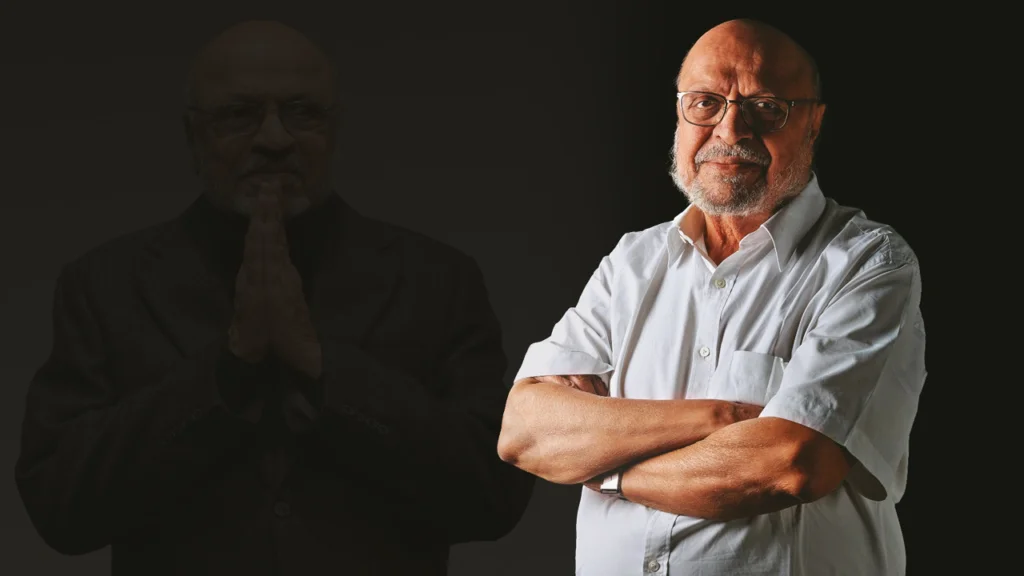
Shyam Benegal – the legendary filmmaker passed away on Monday, 23 December at the age of 90. I would have loved to call him the “father” of parallel or middle-of-the-road Hindi cinema. But, no. Benegal never appreciated classifying films with labels. The title is undoubtedly fitting, as no one in the industry could spearhead meaningful cinema with such unwavering conviction and consistency. So, instead of writing a traditional obituary, I’d rather share how I discovered his work.
The year was 2006. I was still in school when I landed myself in a forum with slightly older people. The participants made casual yet matter-of-fact conversations about realistic cinema. With an unhealthy inclination towards Bollywood and its glamorous exterior, I struggled to add anything meaningful to the discussion.
“So, you watch a lot of Hindi cinema? Who is your favorite director?”, quizzed somebody.
I tendered a silent apology to Yash Chopra, Karan Johar, and Sanjay Leela Bhansali, and muttered, “Shyam Benegal”.
The name resonated with the group and all I could contribute in the subsequent exchanges were nods, smiles, and a bunch of pointless trivia on Zubeidaa (the only Benegal film I had watched). I knew his name since film magazines frequently printed his interviews. Those were pages I constantly rushed through as they lacked gloss and there were no juicy, malicious quotes from Benegal. Or maybe I was too young to be a subscriber of his work.
So, the tricky situation led me to discover the man’s rich body of work. It wasn’t the streaming era and YouTube was not the content hub it is today. I remember placing requests at the local VCD rental library to get titles such as Ankur, Bhumika, and Nishant. It was in Kerala, I was a teenager, and the counter guy would have been a lot less flabbergasted if I were to ask for a Shakeela softcore film.
I eventually found some of his films tucked away in the dusty, forgotten corners of CD shops. A few others, I recall catching on television during off-peak hours. By late 2007, I had watched a substantial number of Shyam Benegal films. While I didn’t fully grasp their politics or deeper subtexts, I began to understand why they were so revered by the intellectual collegians I had encountered the year before.
The first Shyam Benegal film to come out after that phase was Welcome to Sajjanpur. Among its highlights was Amrita Rao, an actress who had left a lasting impression on my teenage self. Since it didn’t have a local release, I watched it on VCD and thoroughly enjoyed it. The diverse characters, the fluid local dialect, the social issues it tackled, and the vibrant universe he weaved immediately made it one of my comfort movies.
Another film that left a profound impact on me is 1983’s Mandi, with its raw portrayal of the flesh trade. From Rukmini Bai to Tungrus to Phoolmani, its characters and moments remain vividly etched in my memory. I could only understand the depth of Suraj Ka Satvan Ghoda and Sardari Begum upon rewatching them a decade later. It could be his upbringing in Hyderabad that helped him develop Muslim characters that were real albeit full of quirks. Sample? The wedding song from Well Done, Abba goes, “Meri banno hoshiyar, cycle pe sawaar, chali jaati cinema dekhne ko…”
Zubeidaa, being the more mainstream film with a popular leading lady and A R Rahman’s hit music, was an instant charmer that I began to appreciate more with time. The understated politics between the leads (Karisma Kapoor, Rekha, and Manoj Bajpayee) is something only a seasoned maker could have established. That said, if there’s a film that makes me muster up a great deal of love for the makers and the artists, it has to be the 1995 drama Mammo – featuring Farida Jalal, Surekha Sikri, and Amit Phalke. I wrote a piece on it a couple of years back on Mother’s Day. Indeed, Mammo Nani’s love for her family and her nation knew no bounds. In the present scenario where we discuss CAA/NRC in India and Donald Trump’s attitude towards refugees, the film’s relevance stands undiminished.
ALSO READ: ‘Mammo’: Story of a Mother Torn Between Love and Politics
In the early 2010s, Shyam Benegal briefly delighted me with media announcements that raised the possibility of a biopic on Maharani Gayatri Devi with Amrita Rao in the central role. It was perhaps the wrong era for such cinema, so the project never materialized. While I have yet to watch his final outing Mujib: The Making of a Nation, I am glad to have tasted the potion of his ideas at the right age which contributed to constructing my value system and politics.
Yes, Shyam Benegal’s films are fiercely political without ever blaring their message through a megaphone. The filmmaker’s vision to build a democratic and conscientious society did not stem from a space of idealism. Lastly, they did not offer simplistic solutions and preachy discourses. More often than not, Benegal’s cinema wonderfully strayed far from telling us what to feel.
The most familiar visual I have of the filmmaker is of him in his place of work. With multiple interviews – both press and broadcast – conducted in his Tardeo office, the bookshelves, the stacks of spiral-bound papers, the wooden furniture, and the intimate clutter of the space are characteristic of the man’s genius. He was actively working even until his last days. To all the 30-somethings planning to retire by 40, meet a man who inspires me to keep striving and never settle.
With Shyam Benegal’s passing, I deeply regret never having had the chance to meet or see him in person. I will miss him not having worked with the Hindi film actors I love the most – Manisha Koirala, Rani Mukerji, Bobby Deol, and Shah Rukh Khan. After all, he was the movie maker I first pretentiously labeled as my ‘favorite’ to have become a fan of his work in real terms. Even though Benegal did not believe in the idea of legacy, I long to stumble upon an Indian filmmaker who is as original, brave, and hardworking as he was.
With heartfelt gratitude for the profound impact he had on my life, both in small and significant ways, I hope Shyam Babu finds the most cinematic and creatively inspiring corner in heaven. May his beautiful soul rest in peace.

